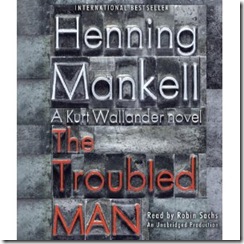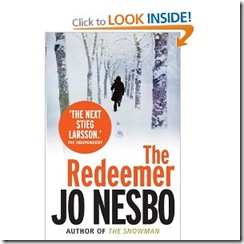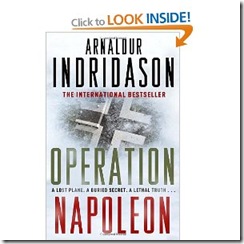In the last week, I’ve read three Scandinavian mystery novels. One Swedish, The Troubled Man by Henning Mankell, One Norwegian, The Redeemer by Jo Nesbo, one Icelandic, Operation Napoleon by Arnaldur Indridason.
The Henning Mankell book is not only emotionally grey but was shocking to me by the way he concluded the adventures of his hero, Kurt Wallander. Six lines of finality and he’s done.
The rotten weather here in my part of Canada has been a perfect backdrop for these books. Rainy, cold, even snow, and a spring that won’t come.
All three books are gloomy. In fact, gloominess and depression is a way of simply being in the world for the characters in these books. Yet their jobs and lives go on. There are almost no guns and no jargon and no gratuitous technology.
We used to talk a lot about gratuitous violence, now it is gratuitous technology: the obsession with cell phones and being “connected’ anywhere, anytime.
What a relief these Northern books are! Even the depression-prone antagonists are a relief. At least they reflect and relate to the craziness of the world. They may have found that depression is the only rational reaction of living in these times.
I have, in the past few months, read several genres of fiction and non-fiction.
Books that make the time go by fast and, in one instance, it worked. This was “The Ask” by Sam Lipsyte. His is a high-wire act of speech – a rant against the invasion of crass, all-pervasive, marketing into our human values. No one relates to another with real sentences or real feelings. It’s stock market and text message talk. What Tony Judt called “no-speak”.
At first, I thought “The Ask” was brilliant, but could Lipsyte keep it going? At some point would it come down to earth where the reader was looking up into the air for some plot – something to navigate by? He certainly kept the banter going to the bitter end. Actually, he’s relentless. But a story that intersected with reality – by what page would that happen? Or was this so much rhetorical aviation? Well, there’s a thin plot to follow but it’s more of a convenience to wrap things up.
What saves the book is that the main character cares about face-to-face physical encounters with other human beings and listens to their real pain. There is a sense of loss of intimacy.
The acid test is that I’ve recommended the book to a few friends – but I’ve been selective.
Which brings me to a non-fiction book I’ve put off discussing for a few months: “Reality Hunger” by David Shields.
There are a lot of names blurbing away on the cover of this book (and a lot of them are now on my no-no list).
Shields calls his book a “manifesto”. I’m not even sure it’s a book, although it has a cover and numbered pages and chapters and all that stuff. If I had to boil it down, I’d say Shields’ main points are:
1. The novel (and plot in general) is finished.
2. The new and exciting genre is “collage” or the “DJ mix” (Shields is a DJ)
I recently heard a panel discussion in a Guardian U.K. Podcast featuring an interview with Shields followed by a panel discussion of it by British authors.
One of the panelists, Toby Litt, said one thing that resonated (and here I paraphrase): “Shields’ book lacks ‘sensibility’”. I think he means that Shields may be in favour of the DJ mix, and may have some things to say, but that his sense or “feel” of how to put them together is missing. Got no rhythm.
I mostly agree. Despite “Reality Hunger”‘s penchant for the DJ mix/collage thing, there doesn’t seem to be much music in the man. And you know what Shakespeare said about that.
What I reacted to most strongly – was horrified in fact – was Shields’ suggestion that writers should consider the cell phone screen as their new medium. Eek!
In it’s staccato burst of paragraphs and proclamations, I expect David Shields still hungers for reality. Good luck to him.
I was looking for an antidote book after this. At a friend’s place the next day, I picked up the first Sue Grafton book “A is for Alibi”, an American mystery.
I felt like putting the spurs to it. Come on, stop telling us about everything you do in your groovy little apartment or the directions around town. Spare the trees.
Ms. Grafton is smart enough to know that her book needed plot, but for me it was like was walking through a hoarder’s house to get to the next thread of it. This lighter reading wasn’t working for me. I had to skim to make it go faster than television.
Back to my Scandinavians.
What you get in their world is the acceptance that there is a constant ache in the background of their characters. It isn’t edited out. This pervasive gloom confirms that although a book may be read in a few hours, real lives go on for hours, weeks, months between the events in the story. These writers aren’t afraid to present that. Whereas most American and English mystery writers, especially the best-selling formulaic kind, eliminate inner life to keep you jumping and distracted, my three recent Scandinavians draw this wonderful allusion that part of their stories are spanning years of a character’s life. At the same time, they don’t fool around with awkward digressions, time travel, and God-forsaken subtitles like “3 days earlier“. !
Their books have an engaging, moving, foreground and a still, contemplative background.
Today’s Listening:
1. Daylight by Kokin-Gumi fr: Zen Garden
2. Sleepwalk by Amos Garrett fr: Home in My Shoes



